15 years of MoneyWeek: how have our forecasts fared?
Over the years we hope we’ve helped our readers to make money and protect their wealth. John Stepek rounds up some of our most significant calls.

Get the latest financial news, insights and expert analysis from our award-winning MoneyWeek team, to help you understand what really matters when it comes to your finances.
You are now subscribed
Your newsletter sign-up was successful
Want to add more newsletters?

Twice daily
MoneyWeek
Get the latest financial news, insights and expert analysis from our award-winning MoneyWeek team, to help you understand what really matters when it comes to your finances.

Four times a week
Look After My Bills
Sign up to our free money-saving newsletter, filled with the latest news and expert advice to help you find the best tips and deals for managing your bills. Start saving today!
Trawling through the MoneyWeek archives is quite an educational experience. As we've noted, we were fans of gold, which was near its nadir, almost from the very start of the magazine in 2000 (that's the cover of our first issue on the right).
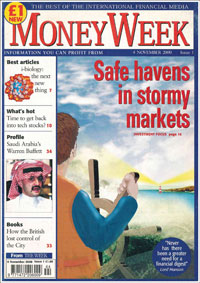
Commodities (which went on to do very well over the course of the decade) and Japan (which has had its ups and downs, to say the least although it's certainly in one of its "up" phases just now and long may that continue) were also early themes. But it wasn't until the magazine had been around for a few years that we began making more emphatic calls. Here are some of the best we made many of them around the time of the credit crisis and how they turned out.
Buy oil (April 2004)
Along with gold, one of the commodities we liked best was oil. Back in April 2004, the oil price was sitting at around $30 a barrel, high by the standards of recent history, but we saw it going much higher. With demand rising and supply having peaked in several countries (including America), the only way was up. As Merryn put it in her editor's letter that week, "the days of easy oil are over".
MoneyWeek
Subscribe to MoneyWeek today and get your first six magazine issues absolutely FREE

Sign up to Money Morning
Don't miss the latest investment and personal finances news, market analysis, plus money-saving tips with our free twice-daily newsletter
Don't miss the latest investment and personal finances news, market analysis, plus money-saving tips with our free twice-daily newsletter
The house-price crash (August 2005)
We can't take credit for getting this one right by any means MoneyWeek spent a lot of time predicting a pending UK house-price crash from as far back as 2004, and the actual collapse didn't arrive until 2008. But one man did get it right, and from quite an astonishing distance. In August 2005, author and land tax advocate Fred Harrison wrote a piece for us arguing that based on long-term property cycles the housing bubble would continue for several years, before things "start to collapse in 2008", with a depression following shortly thereafter.
The dangers of derivatives (September 2006)
Almost two years to the day before Lehman Brothers went bust, Cris Sholto Heaton wrote a beginner's guide to credit derivatives (which included one of the most scarily complicated flowcharts ever printed in the magazine), and their potential for causing trouble. "Far from cutting risk, the spider web of derivatives could push it through the financial system, with losses in unexpected places." We didn't have to wait too long to see just how damaging derivatives could be.
The credit crunch(July 2007)
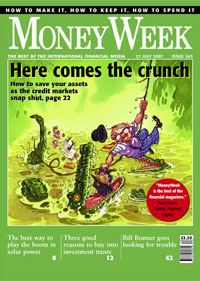
By early summer 2007 it was becoming clear that all was not entirely right with the world. American house prices were falling, subprime mortgages and credit default obligations were regularly cropping up in the business pages, and credit markets were getting edgy. "The cheap money boom is giving way to the credit crunch," we warned.
We suggested sticking with gold and cash and avoiding assets such as commercial property, although we remained keen on big oil and defensive blue-chip stocks.
A couple of months later, Northern Rock went bust and the consequences of the credit crunch started to be felt in earnest.
Avoid Icelandic banks(February 2008)
In February 2008, James Ferguson warned readers looking for online bank accounts to stay away from Kaupthing and Icesave, despite the attractive 6%-plus interest rates being offered on their savings accounts. "If it's Icelandic, then be afraid; these banks are starting to be priced for bankruptcy risk and it's not clear what protection UK savers might have with these foreign accounts." In October 2008, the Icelandic banking sector collapsed and British savers with money in said accounts faced a long and fraught wait to get their money back.
Sell the banks(March 2008)
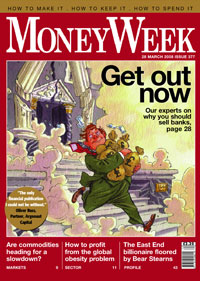
At our March 2008 roundtable, James Ferguson (again) pointed out that "your default position should be that the banks will lose 80% of the value of their equity". At that point, while they were a good way off their record highs set in 2006/2007, Royal Bank of Scotland was still trading at £2.85 per share and Lloyds (now known as Lloyds Banking Group) stood at £2.23a share, and the idea that either ofthem would be nationalised wasstill outlandish. The rest is history if anything, James's prediction was an understatement.
Sell the pound(July 2008)
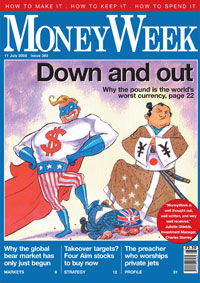
In July 2008, sterling was still riding high against the US dollar a pound would still fetch you not much less than $2. But the writing was on the wall. The credit crunch was biting, Britain had a hefty problem with consumer debt and our reliance on the financial industry didn't bode well, given the turmoil in the banking sector.
We suggested swapping your pounds for dollars (a good idea the pound fell sharply to less than $1.40 within 12 months of the story), Swiss francs (a pretty decent idea too), or Brazilian reals (not so good when the crunch came).
Sell oil (August 2008)
While we had been bullish on oil and the oil sector for several years, and oil had not long since hit its all-time record of more than $140 a barrel, it was becoming pretty clear that a global recession was on the way, and one thing that would suffer in that context had to be oil. With the price back down to around $115 a barrel, we suggested getting out of the sector, or even shorting the oil price.
If anything, we were again insufficiently bearish we suggested that $60 to $70 a barrel would prove to be a floor, but in the end it went to near-$30 a barrel by the end of the year before rebounding rapidly in 2009.
Buy American property (Sep 2009)
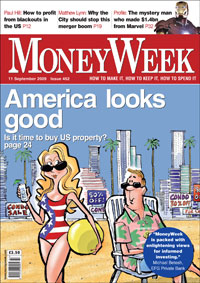
This was a controversial one. One of our American colleagues, Steve Sjuggerud, reckoned that US house prices had fallen far and hard enough, and was looking to pick up a bargain. James wasn't so sure, so we ran a cover with their opposing viewpoints. In the end, James argued that he didn't think you'd lose money on US houses, but he wasn't sure where the catalyst was for making it, whereas Steve was a big fan of Florida real estate. As it turned out, it certainly wasn't a bad time to invest in US housing, although according to the Case-Shiller index it wasn't until 2011 that prices bottomed out (indeed, James began arguing thatit was time to buy US property inApril 2012).
China's out of puff (Jun 2011)
Way back before the world and its dog was panicking about a Chinese slowdown, James Ferguson pointed out that China's efforts to shift to a more consumer-oriented economy were going to take their toll on its growth. "We'd suggest now is a good time to sell out of mining stocks and basic industrial commodities being short commodity currencies, such as the Australian dollar, may be a good trade on a Chinese slowdown." Both the Australian dollar and the commodities sector had pretty much peaked at that point, and it's been downhill ever since (although things might be starting to look up, as we've mentioned a few timesin recent weeks).
Buy Italy(Jun 2012)
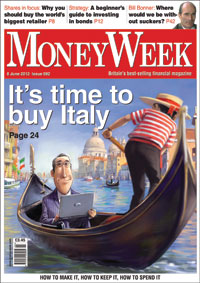
In June 2012, the eurozone was enduring yet another in the long line of Greece-inspired crises that it went through from late 2009 onwards. Sovereign bond yields were soaring, there was an emergency summit on a weekly basis and it looked as though a splintering of the euro was a very real possibility.
However, eurozone stocks were undeniably cheap. Italy's main stockmarket index was trading below where it was in the depths of the 2008 financial crisis.
Given that it's still one of the world's biggest economies, and certainly far too big too fail, we thought there was a good chance that all of the bad news and more was in the price so we suggested buying in. A month later, European Central Bank boss Mario Draghi made his speech saying that he'd do "whatever it takes to preserve the euro".
Markets believed him and backed down, and eurozone stocks recovered from there (though the years to come were still full of shocks related to the Greek tendency to call elections everyfive minutes).
What we're betting on now
We haven't got everything right by any means the housing crash happened, but we were too early on that to claim any credit, and on London we were just wrong (so far). We've also called the end of the bond bull market far too often to admit to. And we were arguably too bearish in the early years of the post-2009 recovery. But overall, we hope we've helped readers protect their money against the worst that markets have thrown at them, and that we've made them money from assets others were shunning. For what we're backing now, see below.
What we'rebuying
Matthew Partridge has looked at some of the biggest technological trends that we see shaping the investment world in the years to come. But being a little more specific on markets, one that we currently like despite, or perhaps because of, the general gloom surrounding it is China.
Just before summer, our Asia expert Rupert Foster noted that the market was due a correction (which has of course happened quite dramatically) and that investors were likely to get a decent buying opportunity come the autumn, which looks to have been a good call so far (the Shanghai Composite is up around 19% since it hit a bottom in 26 August this year).
In the long run, China is following a well-trodden developing-economy path that Japan and South Korea have gone down before it. If its stockmarket follows the script of its predecessors, then China could merely be at the start of a lengthy bull run as its economy continues to evolve. So we'd certainly make sure you have some exposure to China for the years ahead.
We still like Japan, which won't come as a surprise to long-term readers. But ignoring all the headline talk of the "three arrows" of Abenomics, Japan is taking the slow but steady and necessary steps to reform its economy and make it more shareholder friendly and attractive to investors. So despite the recent mild disappointment expressed by several analysts when the central-bank governor, Haruhiko Kuroda, failed to boost Japan's quantitative-easing programme atthe Bank of Japan's most recent meeting, there's a lot more to Japan's rally than mere money printing, and we're more than happy to stick with the market.
Finally, we still like eurozone stocks. In the long run, the euro is doomed (certainly in its present form) for reasons outlinedhere. But markets in Europe still look as though they are much nearer the start of the post-crisis recovery than US markets, and correspondingly offer better value.
Get the latest financial news, insights and expert analysis from our award-winning MoneyWeek team, to help you understand what really matters when it comes to your finances.

-
 How a ‘great view’ from your home can boost its value by 35%
How a ‘great view’ from your home can boost its value by 35%A house that comes with a picturesque backdrop could add tens of thousands of pounds to its asking price – but how does each region compare?
-
 What is a care fees annuity and how much does it cost?
What is a care fees annuity and how much does it cost?How we will be cared for in our later years – and how much we are willing to pay for it – are conversations best had as early as possible. One option to cover the cost is a care fees annuity. We look at the pros and cons.